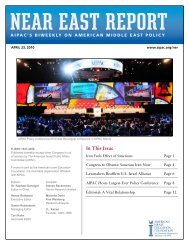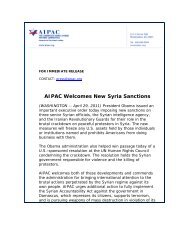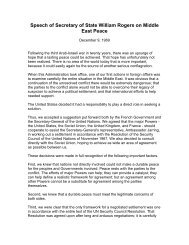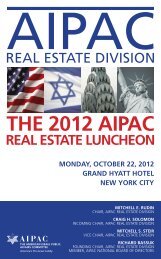2013 Briefing Book - Print Version - Aipac
2013 Briefing Book - Print Version - Aipac
2013 Briefing Book - Print Version - Aipac
You also want an ePaper? Increase the reach of your titles
YUMPU automatically turns print PDFs into web optimized ePapers that Google loves.
SYRIA-LEBANON<br />
cities with house-to-house raids and civilian massacres.<br />
In October 2012, Hizballah officials admitted openly<br />
that Hizballah had operatives in Syria. In December,<br />
senior Syrian defectors to the opposition reported that<br />
Hizballah operatives had been trained to deploy Syrian<br />
chemical weapons. These developments reflect the<br />
strong support that Hizballah’s leaders have expressed<br />
for the Syrian regime over a period of years.<br />
Growing Hizballah Power<br />
Undermines Lebanese Stability<br />
Following Lebanon’s 2005 Cedar Revolution,<br />
which ended Syria’s 30-year occupation of Lebanon, the United States became one of Lebanon’s<br />
largest donors. Since 2006, America has provided the Lebanese Armed Forces (LAF) with more<br />
than $800 million in security assistance.<br />
Despite this effort to build Lebanese institutions independent of Hizballah, the terrorist group has greatly<br />
strengthened its political power. In May 2008, Hizballah launched attacks on civilian neighborhoods in<br />
Beirut, placing the country on the brink of civil war. Weeks later, the pro-Western March 14th movement<br />
and Hizballah reached a temporary agreement granting Hizballah increased leverage in the cabinet. The<br />
following year, Hizballah suffered an electoral setback in parliamentary elections.<br />
However, the pro-Western majority was unable to actualize its electoral success in the formation<br />
of a new government. Instead, it was forced to form a unity government with the Hizballah-led<br />
opposition, which was able to block any legislation of consequence. Hizballah used its position to<br />
defend the assassins of former Lebanese Prime Minister Rafik Hariri. In January 2011, Hizballah<br />
forced the government to collapse over the U.N.’s efforts to bring to justice Hizballah members who<br />
had played a role in the Hariri slaying. Hizballah Secretary General Hassan Nasrallah pledged to<br />
“cut off the hand” of anyone attempting to enforce indictments against Hizballah officials.<br />
Hizballah exploited its political power to install the pro-Syrian Najib Mikati as Lebanon’s prime minister,<br />
leading the U.S. to temporarily suspend the provision of any lethal equipment to the Lebanese Armed<br />
Forces. The Hizballah-backed government remains politically paralyzed in the shadow of the Syrian<br />
uprising and the uncertainty of President Bashar Assad’s rule.<br />
Hizballah, which has consolidated political power in<br />
Lebanon, serves as Iran’s proxy in the unstable country.<br />
167








